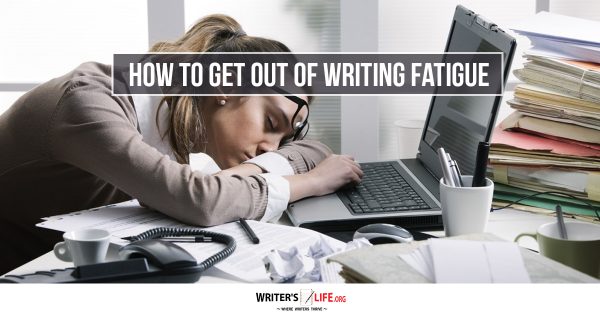- How To Tackle Jealousy In Creative Writing
- Common Submission Mistakes
- How To Stop Your Blog Becoming Boring
- The One Thing Every Successful Writer Has In Common
- How To Make Yourself Aware Of Publishing Scams
- Why Almost ALL Writers Make These Grammar Mistakes At Some Point
- 5 Tips For Authors On How To Deal With Rejection
- Top Mistakes to Avoid When Writing a Novel
- How to Avoid Common New Writer Mistakes
- 10 Mistakes New Fiction Writers Make
How To Get Out Of Writing Fatigue

We’ve all heard of writer's block, but have you heard of writing fatigue? While writer's block can happen suddenly and without warning, writing fatigue is more of a gradual process - but can be equally destructive to your writing and difficult to get over.
We've all had those bursts of writing where you feel as though you are really onto something are amazing. The problem is they can disappear just as quickly as they come. Often when you have a period of prolific writing - one where you seem to be making significant headway with your work, this will be followed by a slump. When this happens suddenly, your writing feels sluggish and you become almost disinterested in it, or just can’t seem to write as well as you did before with everything coming out clunky and awkward.
Writer’s fatigue can be emotionally draining, incredibly frustrating and can have a severe impact on a writers confidence in their ability to get that book written. Typical symptoms are feeling fuzzy headed and having difficulty concentrating, or re-reading the same bits of your writing over and over again. Feeling like every idea you have can’t work, hitting dead ends in your writing, panicking that bits of your book are terrible and don’t make sense and finding that your negative thoughts take over and affect your ability to work are also signs writing fatigue has set in.
So what can one do about it?
Stop when you are on a roll
While it can be tempting to keep on writing until you run out of steam, often it is better to quit while you are ahead and still enjoying the writing process. Put your work aside for the day and come back to it, then you are more likely to be able to pick up where you left off.
Take regular breaks
No matter how lovely your writing space is, sitting at a computer all day will make anyone feel sluggish and fatigued. Treat your writing as a job and make sure you give yourself regular breaks, just as you would if you were working in an office.
Change location
Sometimes a change of scenery can work wonders, so if you feel an onset of writers fatigue approaching, get up, pack your laptop up and head out somewhere else to work. The different atmosphere, sights, sounds and smells may be just what you need to feel energetic and focused once more.
Try clearing your head
It might be a long walk, it might be quiet meditation, it might be just giving yourself the evening off and seeing friends - if your head feels cluttered and unsettled, it’s a sign you need to take yourself off and try to clear it. You know what works best for you, but you’d be surprised how not thinking about your work for a few hours means you can come back to it with renewed vigour.
Write through it
While it can be very tempting to give up on your writing when you are suffering from writing fatigue, this might be one of the worst things you can do. The longer you leave it, the more daunting it may seem. So while giving yourself a break or the evening off is a good idea, don’t wait weeks to start writing again. Otherwise, the weeks could turn into months, the months into years, and…you get the picture!
Writer’s fatigue is no fun and can feel distressing should it happen to you. However, it is essential to try to nip it in the bud as soon as possible, and by following the tips above you can refocus, refresh yourself and learn how to cope with writing fatigue so you can get back to your writing best as soon as possible!

Bethany Cadman -author of 'Doctor Vanilla's Sunflowers'


























